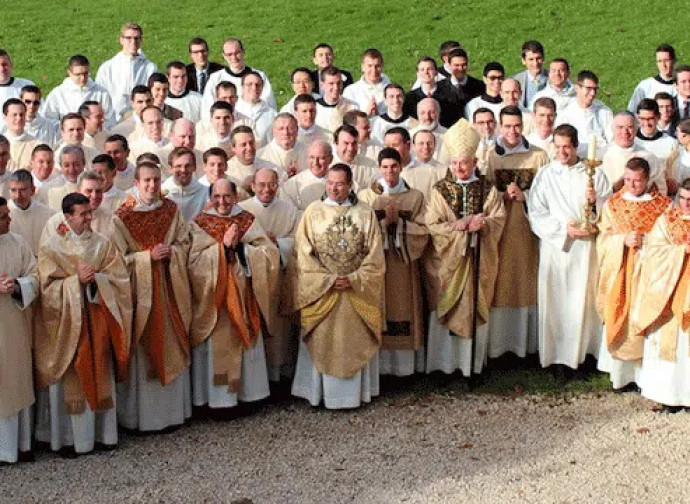Communauté Saint-Martin, too many priestly vocations annoy Rome
The reason for the forced ‘accompaniment’ imposed on the French community enjoying a boom of seminarians amid the general desert of vocations appears due to the Holy See finding the elevated numbers worrisome: too many priests and too many conservatives who risk infecting half of France.

It may be a coincidence, but once again a community with a conservative orientation finds itself under Rome's magnifying glass. On 4 July last, the Dicastery for the Clergy appointed two apostolic assistants, Bishop Matthieu Dupont of Laval and Father François-Marie Humann, to ‘accompany’ the Community of Saint Martin (Communauté Saint-Martin) for the next three years.
This French body was born in 1976 and found hospitality in the archdiocese of Genoa under the protection of Cardinal Giuseppe Siri, settling in the Capuchin convent of Voltri. The eminent Genoese cardinal explained that the Community of San Martino was born ‘for the formation of French seminarians who are called to the priesthood but who refuse the confusion found in certain modern seminaries’. After 17 years in Italy, the institute returned to the diocese of Blois in 1993. But, if 31 years ago there were 30 seminarians, today there are more than 100, marking an important exception in the vocational desert that involves the now formerly ‘very Catholic’ France.
In fact, over the years, the Community of Saint Martin has become a source to draw on for dioceses grappling with vocational crises, being able to count on 175 priests and deacons. Yet, despite this, the Holy See has found it necessary to put this reality under ‘investigation’. Indeed, it seems that it was the general crisis in vocations that set off the alarm bells in the Vatican.
The appointment of two apostolic assistants follows the pastoral visit decided by the Dicastery for the Clergy and carried out between July 2022 and January 2023 under the responsibility of Monsignor Benoît Bertrand, Bishop of Pontoise. The conclusions of the visit brought to light shadows on the figure of Father Jean-François Guérin, the founder who died in 2005 and against whom accusations of an ‘abusive climate in the exercise of authority and spiritual accompaniment’ and also of ‘forced kissing’ were allegedly made by some interviewees who were of age at the time. This is why, in a letter, Monsignor Matthieu Dupont and Father François-Marie Humann explained that ‘it will be a matter of bringing truth and clarity to the founding period of the Community of Saint-Martin, to the personality of the founder who died in 2005, and to the facts of which he is accused by several former members of the community’.
Unfortunately, it is a script already seen in similar situations. Notably, this kind of three-year ‘commissariat’, also aims at other objectives. The two apostolic assistants, in fact, made it clear that ‘it will also be necessary to work on the issue of vocational pastoral care and its reception, especially of the youngest members, to ensure better discernment and prudence when entering formation. It will also be a matter of supporting the renewal process of initial and ongoing formation in the light of Roman and national norms'. Words that hint at Rome’s intolerance of too many vocations in this community with a conservative tendency and which by supplying thirty dioceses with priests risks ‘infecting’ half of France.
The priests of Saint Martin's, who fully accept the teachings of the Second Vatican Council, are very attentive to the solemnity of the liturgy, they also celebrate in Latin but according to the 1969 Roman Missal, they love Gregorian chant and prefer to wear cassocks at all times. In this case, therefore, there is Nousus Antiquior involved, but an overly traditional ecclesial sensibility seems to weigh in any case. It is difficult to conclude otherwise considering the mention of the ‘work of reform that the Dicastery deemed necessary after reading the conclusions of the Visitators’ made in the letter of the two newly appointed Apostolic Assistants.
Cardinal Sarah: Ordaining married priests is a pastoral catastrophe
In the book From the Depths of Our Hearts, Cardinal Sarah deduces the consequences of the teachings of Benedict XVI, especially in the light of the Amazonian Synod which he was present at. By "weakening" priestly celibacy, Sarah says, it is primarily the faithful who would suffer the devastation, because they would be deprived of the visible sign that the priest belongs totally to God. The problem lies with some Western and South American bishops who live celibacy as a burden. And he condemns an alleged "right to the Eucharist": "A community that is formed with the idea of a" right to the Eucharist "will no longer be a disciple of Christ."
A collapse in vocations, Ireland discovers it’s post-Christian
The Irish Church was once a forge for missionaries; today it’s experiencing a serious shortage of priests and vocations. Several dioceses (including Dublin) have responded by developing plans with lay-led liturgies, fewer Masses and unified parishes. Yet, even in the midst of the crisis, there are still some institutes where hope flickers.
